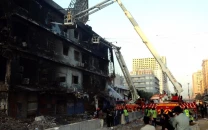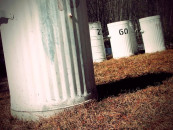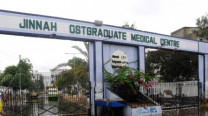Bund politics and army’s intervention
“Damn the politicians who are squabbling over their farmlands while we in Sukkur will probably drown.”

Bund politics and army’s intervention
“Sir, what is going to happen in Sukkur, I am worried about my kids,” he kept asking every now and then.
Frankly, we did not have a rosy picture to portray, but I managed to console him. At one stage he burst out. “Damn the politicians who are squabbling over their farmlands while we in Sukkur will probably drown.”
Politicians, people’s representatives drowning their voters!
I stopped in the middle of what I was doing, and with eyes peeled went for this story.
People’s representatives drowning their own voters… I could not get this thought out of my mind. Before we go further, let me tell you a bit about two bunds on either sides of the Sindhu or the Indus River.
Ali Wahan bund is on the eastern bank, a little upstream of Sukkur Barrage.
It slows down the swerving Sindhu and prevents the water from entering Rohri. This double bund was built four decades ago at a little town called Ali Wahan. Tori bund is located further upstream on the western bank of Indus.
Sukkur Barrage can withstand 1.4 million cusecs of water. But since it has passed its expiry date, there were strong fears that it might cave in. On the other hand, parts of the ancient city of Sukkur are 10 feet below the river level. A strong wall known as Bunder Wall prevents the gushing river from overflowing.
When the water flowing under the 66-gate barrage touched the danger level, it sent people into a spell of anticipation and apprehension. Even the authorities became worried. The good news is there was a number of solutions to reduce the water flow including breaching the Ali Wahan bund and sending the water rolling into the Cholistan desert.
But our federal labour minister, Khursheed Shah, raised his hand. “No sir, if you breach Ali Wahan, it is likely to inundate my standing crop.” He put the foot down in high-level meetings. Then he dispatched a group of armed men to guard Ali Wahan. But the authorities sent an SOS to the army which obliged pronto. After taking control of the barrage, the army set dynamites, waiting for the government’s orders to blow a breach in Ali Wahan.
The other option was to blow up the Sanghi bund that would have inundated the neighbouring Pannu Aqil cantonment, Asia’s largest military establishment and strategically very important.
But while rumours did the round in Sukkur that the army put Khursheed Shah under house arrest and signed shoot-at-sight orders if his men did not move from Ali Wahan bund, Sindh Chief Minister Qaim Ali Shah stepped in.
Guess who came to the rescue of this beleaguered feudal? Late one night, we heard in Sukkur that provincial irrigation minister, Jam Saifullah Dharejo allegedly ordered a breach in Tori bund on the west bank of Indus to reduce the water pressure on Sukkur barrage and Sukkur city. Engineers claimed it would take away at least a hundred thousand cusecs of water from the main flow.
Tori breach wreaked the ugliest havoc on Kandhkot, Ghouspur, Sultanpur, Thul, Jacobabad, Shikarpur and Jaffarabad. Khursheed Shah’s land was reportedly saved but at the cost of completely inundating four towns and partially destroying many towns and villages. The Sindh government itself claimed at least two million people were displaced.
The Tori bund breach annoyed another federal minister, Aijaz Jakhrani in the Jacobabad region. I met him in Jacobabad where he was peddling the ‘Save Jacobabad’ cause. I saw him at the DCO office where I was told he was pushing the city machinery into breaching the by-pass bund, on the western outskirts of Jacobabad, to release pressure on the historic city and along with it the neighbouring Shahbaz airbase. He did succeed, but just.
The Jacobabad city’s earthmoving machinery had placed cuts on the by-pass and was getting ready to blow it up when another politician, in fact, our former prime minister, Mir Zafarullah Jamali, brought in his armed men to stop the operation as it would push the water flowing out of Tori towards his estate, Rojhan Jamali in neighbouring Balochistan.
The army once again stepped in and stopped the breach operation.
Now here’s the most intriguing part. The Tori bund breach put the Shahbaz airbase in harm’s way. Military assets and aircraft were moved to safe bases. Shahbaz airbase is believed by many to have played a crucial role in the US attack on Afghanistan. It served as a stop-over base for the US supply from the aircraft carrier anchored in the Arabian Sea.
This had irked many, but there’s nothing they could do to stop the killing of fellow Pashtuns in Afghanistan. Here’s what I heard from a pashtun elder in Sultanpur. He told me when saboteurs saw Tori water only a few feet away from the Shahbaz airbase runway, they blasted the Shahi canal’s gates connecting the Sim Shakh (tributary) to further flood the area so that the water could cross over the high walls of Shahbaz airbase, forcing the authorities to abandon it.
TO BE CONTINUED
Published in The Express Tribune, August 26th, 2010.



















COMMENTS
Comments are moderated and generally will be posted if they are on-topic and not abusive.
For more information, please see our Comments FAQ